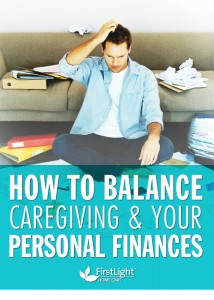Are you jeopardizing your own financial future and health by taking care of your aging parents? If you’re in the sandwich generation, your kids may be in college or thinking about going to college in the near future. You’d like to retire someday yourself, but your 401K is not as hefty as you’d like. You’re also hoping to collect your own Social Security.
This is the predicament many of the sandwich generation and baby boomers face.
At FirstLight Home Care, we know it’s not about the money … caregiving for your parents is a labor of love, a payback for all the hard work and sacrifices they made in raising you and your siblings.
 You’re Not Alone
You’re Not Alone
According to the Pew Research Center , nearly 40 percent of American adults are caring for someone with a significant health issue, up from 30 percent in 2010. And studies from the National Alliance for Caregiving and the MetLife Mature Market Institute reveal that those who care for an older family member are more likely to have poor health themselves in addition to shortchanging their own financial future.
You’re a Caregiver
If you’re a caregiver, you know the stresses of trying to juggle work, home and your extended family. According to a study by AARP, the average caregiver is female, 49-years-old, works outside the home, and spends almost 20 hours a week providing unpaid care to her mother or father for nearly five years.
You probably haven’t added up the cost.
A 2011 study from MetLife predicts that a female caregiver who leaves the work force to care for a parent will lose, on average, more than $324,000 in wages and Social Security and pension benefits over a lifetime.
Here’s some financial tips to think about when it comes to the costs of taking care of your aging parents:
- Take advantage of any benefits from Medicare and Medicaid. Medicaid does cover some stays in assisted living and Medicare will cover some rehabilitative costs on a short-term basis. Some states offer programs that use a Medicaid waiver to allow direct federal payments to family caregivers for their services.
- Your parents could pay you for helping to care for them. It is important to have a caregiver contract in place, so it is not seen as a gift. Giving you a gift could later hurt their chances of qualifying for Medicaid. You need to pay tax on your earnings and your parents must show the monies they have paid to you on their tax forms. For more information, go to AARP.
- Take out a long term care policy on yourself, and if it’s not too late, your parents. Read the policy carefully because some plans offer a cash benefit that may enable them to pay you or an in-home caregiver for home assistance. Also, consider having a life insurance policy on your parents to help defray their funeral costs.
- Can you declare your parent as a dependent on your income taxes? They don’t have to live with you – you just need to provide 50% of their basic living expenses. There is some fine print though – your parent’s earnings cannot exceed the deduction amount.
- Are you a Veteran? Research their Aid and Assistance program.
- The Family and Medical Leave Act of 1993 allows many people to take up to 12 weeks off of work, without pay, to care for a family member without fear of losing their job.
- Hire a home care agency such as FirstLight Home Care. This can be an affordable option that can also help save your sanity!
Unfortunately, there is no great solution for how to meet the financial obligations for three generations. It involves some tough conversation, adhering to a strict budget, and leaning on family and friends for support. At FirstLight Home Care, we’re here to help with in home caregiving any way we can!
